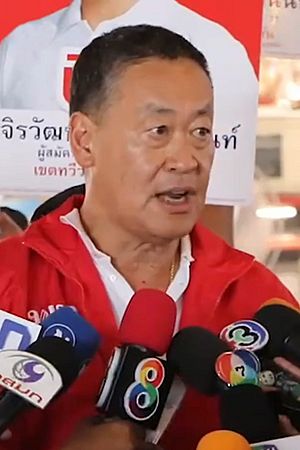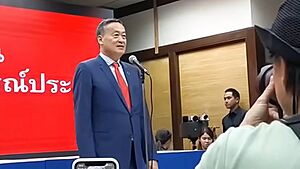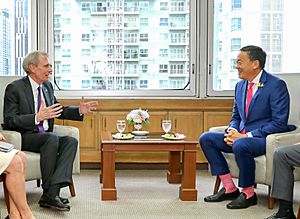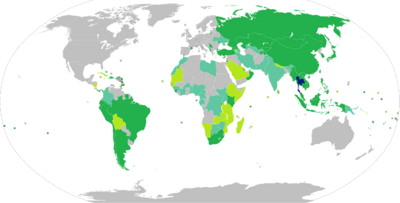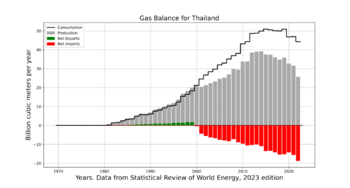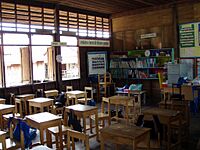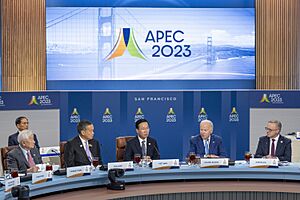Srettha Thavisin facts for kids
Quick facts for kids
Srettha Thavisin
MPCh MVM
|
|
|---|---|
|
เศรษฐา ทวีสิน
|
|
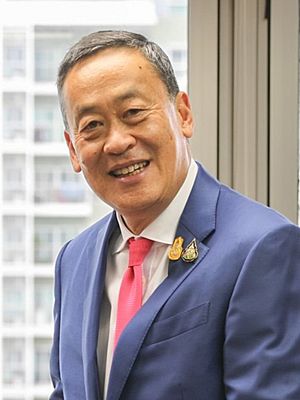
Srettha in 2023
|
|
| 30th Prime Minister of Thailand | |
| In office 22 August 2023 – 14 August 2024 |
|
| Monarch | Vajiralongkorn |
| Deputy |
See list
Phumtham Wechayachai
Somsak Thepsuthin Parnpree Bahiddha-nukara Anutin Charnvirakul Patcharawat Wongsuwon Pirapan Salirathavibhaga Suriya Juangroongruangkit Pichai Chunhavajira |
| Preceded by | Prayut Chan-o-cha |
| Succeeded by | Phumtham Wechayachai (acting) |
| Minister of Finance | |
| In office 1 September 2023 – 27 April 2024 |
|
| Prime Minister | Himself |
| Preceded by | Arkhom Termpittayapaisith |
| Succeeded by | Pichai Chunhavajira |
| Personal details | |
| Born | 15 February 1962 Bangkok, Thailand |
| Political party | Pheu Thai (since 2022) |
| Spouse |
Pakpilai Paladraksa
(m. 1989) |
| Children | 3 |
| Education |
|
| Occupation |
|
| Signature | |
| Nickname | Nid (นิด) |
Srettha Thavisin was the 30th Prime Minister of Thailand. He served from August 2023 until August 2024. Before becoming prime minister, he was a very successful businessman. He helped start a big real estate company called Sansiri.
During his time as prime minister, Srettha focused on making Thailand's economy stronger. He worked to bring more tourists to the country. He also tried to get more international businesses to invest in Thailand. His time in office ended when a court decided he had not followed certain rules.
Contents
Early Life and Education
Srettha Thavisin was born in Bangkok, Thailand, on 15 February 1962. He is the only child of Captain Amnuay Thavisin and Chodchoi Jutrakul. His family has connections to several important Thai business families.
Srettha went to Prasarnmit Demonstration School in Bangkok. For his higher education, he first earned a bachelor's degree in Civil Engineering from Chulalongkorn University. He then got a Bachelor of Arts in Economics from the University of Massachusetts Amherst. Later, he earned a Master of Business Administration (MBA) in Finance from Claremont Graduate University.
Business Career
Srettha started his career at Procter & Gamble. He worked there for four years after finishing his master's degree in 1986. In 1988, he co-founded Sansiri. This company became one of Thailand's top real estate developers. Under his leadership, Sansiri built over 400 housing projects.
Srettha supported large government projects that could help the real estate business. He believed these projects would be good for the economy. His leadership helped Sansiri grow, even during the COVID-19 pandemic in Thailand. In 2020, he bought a very expensive piece of land in Bangkok.
Srettha paused his business career in 2023 to enter politics. Thai laws do not allow elected officials to own shares in companies. So, he transferred all his shares in Sansiri to his daughter, Chanada Thavisin, in March 2023.
Political Career
Srettha was against the political protests that happened in Thailand between 2013 and 2014. After a military takeover in 2014, he followed orders to report to the military.
He had strong connections with former prime ministers Thaksin Shinawatra and Yingluck Shinawatra. In the 2023 Thai general election, Srettha was one of the candidates for prime minister for the Pheu Thai Party.
The 2023 Election
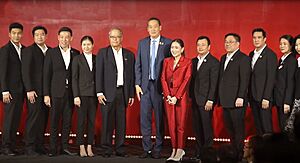
In November 2022, Srettha announced he would join the Pheu Thai Party. He became one of the party's three prime ministerial candidates in April 2023. During the election campaign, polls often showed him behind another candidate, Paetongtarn Shinawatra.
Srettha started his campaign in Bangkok. He gave his first big speech in Phichit province. He also said that Pheu Thai would not work with parties involved in the 2014 military takeover.
After the election on May 14, Pheu Thai came in second place. They first tried to form a government with the Move Forward Party. However, the Move Forward Party's leader could not get enough votes to become prime minister.
Pheu Thai then tried to form a government. They included other parties, even those Srettha had said he would not work with. Srettha explained this was a necessary step to form a stable government.
On August 22, 2023, Srettha gave a speech to the Thai Parliament. He shared his plans and goals if he became prime minister. He was then elected as the 30th Prime Minister of Thailand. He received 482 votes out of 728.
Premiership (2023–2024)
After being elected, Srettha formed his group of ministers, called a cabinet. He also presented his plans for the next four years to parliament. On August 23, 2023, King Vajiralongkorn officially appointed Srettha as prime minister.
On September 5, Srettha was sworn in as prime minister and minister of finance. The new cabinet had 34 ministers from six different parties. Srettha later stepped down as finance minister in April 2024.
Domestic Affairs
Srettha visited several provinces in Thailand's northeast in September 2023. These areas are known for supporting his party. He visited the Ubol Ratana Dam, which was experiencing dry conditions. Srettha said that improving farming was a top goal for his government. He wanted to help farmers grow 50% more crops. He also discussed shipping with China in Nong Khai.
Economy
On September 11, Srettha presented his government's economic plans to Parliament. He said the economy was in a "crisis." He believed that high interest rates were hurting businesses. He asked the Bank of Thailand to lower these rates.
However, the Governor of the Bank of Thailand disagreed. He did not think the economy was in a crisis. He also felt that the government's short-term plans would not fix the main economic problems. The central bank decided to keep interest rates high. Srettha believed that the government and the central bank should work together.
Infrastructure
Srettha's government approved a large project called the Thai Canal. This project aims to build a new shipping route. It is expected to cost a lot of money and be finished in two stages by 2039. The goal is to handle 20 million cargo containers each year.
Srettha sought money from American and Chinese companies for this project. However, many local people were worried about it. Srettha admitted that the government had not done a good job explaining the project to the public.
Tourism
Srettha worked hard to boost Thailand's tourism. In September 2023, he removed visa requirements for tourists from China and Kazakhstan. This was done to attract more visitors during holidays like Golden Week and Chinese New Year. He welcomed the first flight from Shanghai after this change. The visa exemption for Chinese tourists became permanent in March 2024.
In October, the government also allowed Russian tourists to stay for 90 days instead of 30. This was timed for the Russian winter season. Russia sends the fifth-highest number of visitors to Thailand. Indian and Taiwanese travelers also received visa-free entry for a period. These changes helped Thailand's tourism recover greatly after the pandemic.
Srettha also wanted Thailand to become a major place for concerts. He learned that singer Taylor Swift did not perform in Thailand because of a deal with Singapore. He then promised to support making Thailand a concert hub.
Strengthening the Thai Passport
Srettha wanted to make the Thai passport more powerful. He discussed with leaders from Belgium and Germany about making it easier for Thai people to visit Europe. Thailand also wanted to extend the time people from Europe could stay without a visa. Thailand planned to work with other Southeast Asian countries to talk with the European Union.
In February 2024, Australia's Governor-General agreed to consider a visa-free travel plan with Thailand.
Digital Wallet Scheme
Srettha's party promised a "digital wallet" plan during the 2023 election. This plan would give ฿10,000 to Thai citizens over 16. The money had to be spent near their home within six months. This would cost the government about ฿560 billion.
Srettha supported this plan, even though some people had concerns. He said it was important to kickstart Thailand's economy. Many economic experts, including those from the Bank of Thailand, worried about the long-term effects. A former Finance Minister also had doubts about the plan.
The launch of the digital wallet scheme was delayed several times. It was planned to start in February 2024, then May 2024. In July 2024, Srettha announced that people could register for the program starting in August.
Electric Vehicle Industry
Srettha met with Elon Musk in September 2023 to discuss Tesla investing in Thailand's electric vehicle (EV) industry. He wanted to attract more EV companies to Thailand. He also discussed with Malaysian and Chinese car companies about building EV plants in Thailand. Thailand also worked with Toyota to develop the EV industry.
Since Srettha's government took office, the EV market in Thailand has grown a lot. China's main car technology center even set up a regional hub in Thailand. In January 2024, Thailand found two large lithium deposits. Lithium is a key material for EV batteries.
Guns
After a shooting at a shopping mall in Bangkok in October 2023, Srettha promised to focus on preventing such events. He contacted foreign ambassadors to assure them of tourist safety.
The government then started a big effort to find illegal guns. By October 12, they had seized over 2,000 illegal firearms. The Interior Minister also stopped the trade and import of new firearms.
Military
Srettha said he wanted to work with the military to develop the country together. He did not want to call it "reform."
In December 2022, a Thai navy ship sank. The US military offered help, but Thailand did not respond. Later, the US warned Thailand about working with a Chinese company to salvage the ship. The Thai navy then canceled the plan to use the Chinese company.
Environment
Srettha's government had plans to deal with air pollution and support sustainable development. In October 2023, Srettha spoke about his vision for a sustainable economy. He emphasized protecting human rights and fighting climate change.
He also discussed Thailand's role in global sustainable development in 2024. He wanted to lower electricity costs and encourage homes to use solar power. In November 2023 and January 2024, he visited Chiang Mai to address air pollution issues like forest fires and smog. He supported a Clean Air bill.
However, a court ruled that the prime minister and the environment board had not done enough to fix the air pollution in the North. Srettha then held a meeting to follow the court's order.
Education
Before becoming prime minister, Srettha wanted to reduce differences in education. He aimed to help young people become knowledgeable and responsible. His government also worked to create a list of all students who dropped out of school. Srettha wanted to make sure no child in Thailand missed out on education. He also stressed the importance of improving young people's skills.
Foreign Affairs


In September 2023, Srettha met with leaders from companies like Tesla, Google, and Microsoft. He wanted to encourage them to invest more in Thailand. He expected about $5 billion in investments from Google, Microsoft, and Tesla.
Srettha also gave his first speech at the United Nations General Assembly in New York. He spoke about Thailand's desire to work with other countries and strengthen its democracy. He also visited the New York Stock Exchange.
Thailand, under Srettha, also worked to become a candidate for the United Nations Human Rights Council.
Srettha traveled to Hong Kong, Brunei, Malaysia, and Singapore in October 2023. He met with leaders to encourage investment in Thailand. He discussed trade, food security, and tourism. He also worked to help secure Thai hostages taken by Hamas.
From October 16 to 19, Srettha visited China. He met with Russian President Vladimir Putin to discuss trade and cultural ties. Srettha invited Putin to visit Thailand in 2024, and Putin accepted.
In October 2023, Srettha visited Laos. He discussed increasing trade between Laos and Thailand. They also talked about building new transportation links, like a railway across the Mekong River. They agreed to build a sixth friendship bridge.
Srettha visited Japan in December 2023. He temporarily removed visa requirements for Japanese business travelers. He discussed strengthening cooperation between Thailand and Japan. He also offered Thailand's help in bringing peace to Myanmar.
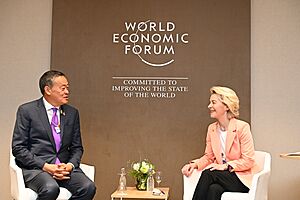
In January 2024, Srettha attended the World Economic Forum in Switzerland. He promoted Thailand's land bridge project. He also met with Bill Gates to discuss a Microsoft data center in Thailand. He met with the head of Dubai Ports World, who showed interest in the land bridge project. Srettha felt these meetings were very successful.
On January 25, 2024, Srettha welcomed the President of Germany, Frank-Walter Steinmeier. This was the first visit by a German President in 22 years. They discussed trade, investment, and climate change. President Steinmeier praised Thailand's efforts to strengthen democracy. He also said Germany would invest more in Thailand's electric vehicle industry.
Srettha visited Sri Lanka in February 2024. Thailand and Sri Lanka signed a Free Trade Agreement to boost economic cooperation. They also agreed to work together on gems and jewelry.
In February 2024, Cambodian Prime Minister Hun Manet visited Thailand. They discussed transport, trade, and investment. They aimed to increase trade between the two countries. They also talked about developing natural resources in a disputed area.
Foreign Policy
Srettha spoke out against the actions of Hamas during the Gaza war. He ordered the Thai Air Force to help evacuate Thai citizens.
Regarding the Myanmar civil war, Srettha's government considered sending humanitarian aid to Myanmar.
Dismissal
In May 2024, a group of senators asked the Constitutional Court to remove Srettha from office. This was because Srettha had appointed a minister who had a past issue.
The minister resigned on May 21. However, on August 14, 2024, the Constitutional Court removed Srettha from his position. The court said he had not followed rules about the ethics of cabinet ministers. Srettha was the fourth Thai prime minister in 16 years to be removed by the courts. He said he was surprised but would respect the decision.
Political Positions


Social Issues
Srettha has shown support for former Prime Minister Thaksin Shinawatra. He also criticized how the previous prime minister handled the COVID-19 pandemic. Srettha supported the pro-democracy protests from 2020 to 2021.
Srettha is considered a liberal on social issues. He does not support forced military service. He has also spoken out for environmental protection and LGBTQ rights.
Economics
In an interview in 2023, Srettha explained his economic ideas. He believes in "capitalism with empathy." This means he thinks that businesses can be successful while also caring for people who are struggling. He said that problems like economic differences should be discussed with understanding. With the Pheu Thai party, he promised to boost the economy and fight poverty. He planned to do this by raising the minimum wage and with the ฿10,000 'digital wallet' scheme.
Personal Life
Srettha's nickname is Nid. He is 1.92 meters (about 6 feet 3 inches) tall. This made him one of the tallest leaders in the world when he was in office.
Srettha is married to Pakpilai Thavisin, who is a businesswoman. They have two sons, Napat and Warat, and one daughter, Chananda. His mother, Chodchoy, passed away in July 2024.
He collects old travel trunks, especially those made by Louis Vuitton. Srettha is a fan of Liverpool F.C., a football team. He also helps support Sansiri Academy, which trains young football players in Thailand. Srettha often uses social media, especially X (formerly Twitter), to share updates.
In December 2023, it was revealed that Srettha had a lot of wealth. He owned a classic Aston Martin DB5 car worth ฿50 million. His yearly earnings were around ฿153 million.
Images for kids
See also
 In Spanish: Srettha Thavisin para niños
In Spanish: Srettha Thavisin para niños


